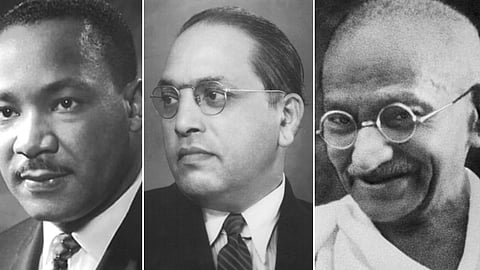
New Delhi- As one explores the stories of B.R. Ambedkar, Martin Luther King Jr., and Mahatma Gandhi, a common thread emerges—unpleasant journeys that shaped their battles against discrimination. These remarkable individuals, advocates for equality and justice, shared experiences that fuelled their commitment to fight against prejudice. Let's delve into their stories to understand the resilience and solidarity that united them in the struggle against discrimination.
Martin Luther King Jr. ( 15 January 1929- 4 April 1968) was an American jurist, activist, and political philosopher who became one of the most prominent leaders in the civil rights movement for Blacks in America. He was acutely aware of the slur of racism, having been brought up with the pain and stigma associated with it.
Similarly, Babasaheb Ambedkar (14 April 1891- 6 December 1956) was a great philosopher, academician, jurist, scholar, journalist, social reformist, politician, and the main architect of the Indian Constitution. He, too, was brought up with the pain and stigma of untouchability.
However, Mohandas Karamchand Gandhi ( 2 October 1869- 30 January 1948) was born into a privileged class in India during the time when India was a colony of the British Empire. This illustrates that all three were victims of their birth identities—caste and race.
The article attempts to connect them through the humiliations they faced during their travels, which ultimately led them to become emancipators of Dalits (Untouchables, Indians, and Blacks in India and America). King, an optimist and humanist, believed that not all white people were enemies; rather, the true enemy was inhuman minds. Before him, Ambedkar also spoke about his enemies, stating that Brahminism is the enemy, not Brahmins. Similarly, Gandhi emphasized that the enemy was Imperialism, not the British Empire.
Firstly, King emerged as a prominent leader in the civil rights movement after the protest against the segregation of African Americans on buses in Montgomery, Alabama.
They boycotted buses and demanded integration, refusing to ride city buses to protest segregated seating. The boycott, lasting from December 5, 1955, to December 20, 1956, marked the first large-scale U.S. demonstration against segregation. Rosa Parks was the first African American to be arrested. Later, King turned that boycott into a mass movement against racism, gaining widespread support. The Supreme Court ordered Montgomery to integrate its bus system, and King was recognized as a prominent civil rights leader for blacks worldwide.
Secondly, Ambedkar wrote about humiliating incidents in his life through his writings. He described an incident when his family moved to Satara for his father's job with the Public Works Department as a cashier. One incident that left a deep scar on Ambedkar's psyche occurred in Satara when a bullock cart driver threw him, along with his elder brother and a nephew, out on the road upon learning their caste. This incident happened while they were on their way to Goregaon to meet their father, who had called them to spend summer vacation with him as he couldn't get leave to go home.
Thirdly, Gandhi faced humiliation in South Africa during a visit related to a case involving Abdulla, a businessman of that time who had purchased a first-class train ticket for Gandhi from Durban to Charlestown. Just before the train reached the Pietermaritzburg station, a European passenger brought the presence of a 'coloured' man in the first-class section to the attention of train officials. When they demanded that Gandhi move to the van compartment, he refused and dared them to call a constable. The officials did call a constable who promptly pushed Gandhi not only out of his first-class compartment but out of the train along with his bags.
These three legends of Dalit rights travelled in three different continents, using nonviolent resistance as their chosen method. On March 9, 1959, before leaving India, King was more convinced than ever that nonviolent resistance was the most potent weapon for oppressed people in their struggle for justice and human dignity. Ambedkar also used nonviolent resistance against casteism in the Mahad Satyagraha. Gandhi is globally known for his love and Satyagraha. King expressed about his tour of India in 1959, "To other countries, I may go as a tourist, but to India, I come as a pilgrim."
All of them fought for liberty, equality, and justice. While we can claim to have liberty with our democratic political system and justice with our independent judiciary, the claim of equality remains challenging. Economic inequality has been steadily increasing worldwide, as per the Oxfam report (2024), which revealed that the wealth of the richest individuals has doubled since 2020, while nearly five billion people have become poorer. The report warns that if current trends persist, the world's dream of being free from poverty will remain just that—a dream. Without equality, we cannot fulfill the dreams of King, Ambedkar, and Gandhi.
-The Author Dr. Krishan Kumar is a scholar based in Haryana specializing in Dalits and Marginalized Studies, with a focus on social inclusive policies. He is currently engaged in research related to caste issues.
Also Read-
You can also join our WhatsApp group to get premium and selected news of The Mooknayak on WhatsApp. Click here to join the WhatsApp group.